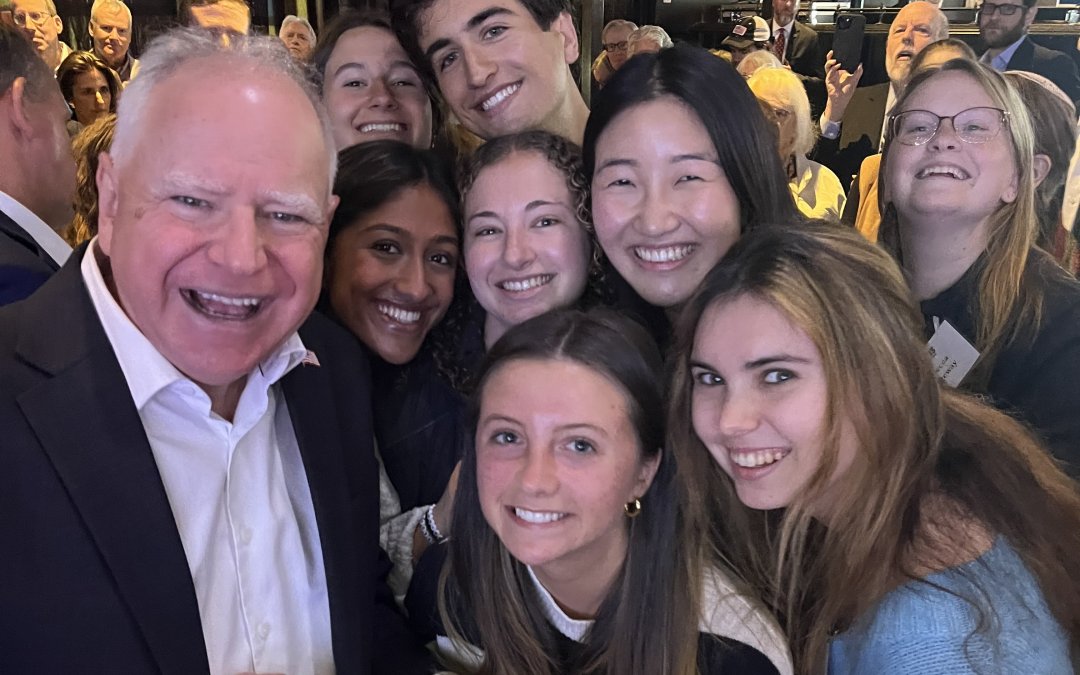WASHINGTON — Youth voter turnout has historically lagged behind that of older generations, but this year a new force has emerged to help engage youngsters — including first-time voters — to turn out for the election. College students themselves have pushed others on campus to become more politically active and to vote.
For students who are part of undergraduate political organizations, the work began on campus. Eunho Jung, the secretary of the University of Pennsylvania Democrats, said her organization tabled on the main campus pathway, Locust Walk, with other non-partisan voting organizations “almost every single day” from when students returned to campus up until Pennsylvania’s voter registration deadline of Oct. 21.
“If you ask any UPenn student, they will tell you that they haven’t been able to walk through Locust Walk without being asked if they’re registered to vote in Pennsylvania,” Jung said.
Beyond ensuring that students are registered to vote, student political organizations have also been working to promote the candidates they support or endorse through creative means.
“We are approaching students and offering them literature on Republican candidates at all levels,” said Matthew Trott, president of the University of North Carolina at Chapel Hill College Republicans. “We’ve given out several hundred flyers for different Republican candidates and engaged a similar number of students.”
Tess Phillips, the secretary of College Democrats at Michigan State University, said her organization has also been printing literature — but delivering them straight to students’ dorm rooms through a strategy called “dorm storming.”
“We send out our members and they drop [literature] off at each dorm room, sliding it under the doors of every dorm. Our goal is to hit as many dorms as we can before the election,” Phillips said. “It’s a really great way of being able to give kids information without extending our resources or having to have all these in-depth conversations.”
Her organization has also leveraged a social media presence with over 2,800 followers on Instagram to reach a Generation Z audience, filming short-form content with campaigns.
“That’s been a really cool, unique feature specifically to target young voters that doesn’t necessarily hit the same kind of effect that it would for older constituents that are living around our area,” Phillips said.
However, student political organizations have also made efforts to connect with constituents outside of campus, employing strategies such as doorknocking, canvassing and phone banking to get the word out about the candidates and policies they support.
Trott said he sees differences in the policy concerns older constituents have versus students.
“In our conversations with students, the number one issue has been the economy,” Trott said. “Whereas in the community, it has varied a lot, and can include things like education, crime, immigration, all sorts of things.”
Organizations located in swing states also have had the unique opportunity to meet political heavyweights and hear them speak, including the presidential and vice presidential candidates. Indeed, the University of Pennsylvania Democrats were able to meet Vice President Kamala Harris on Sept. 19 and her running mate, Tim Walz, on Oct. 25 through campaign events.
“All four [presidential and vice presidential] candidates have visited Pennsylvania the most out of any other swing state,” Jung said. “We got so lucky.”
However, Trott says that the flip side of residing in a swing state is the amount of work organizations need to put in to secure votes for their candidates.
“If we were not in a battleground state, I doubt we’d be doing as much, because here we just have to work so much more to ensure that we can win,” he said.
Swing state or not, Phillips recognizes a need for students to vote.
“This is going to be a monumentally close election, and that’s why I feel that any effort we can do to even just get kids registered to vote, to get them to the polls, is going to make a huge difference,” she said.
Trott agrees with the sentiment that youth voter turnout must rise.
“We are the ones who will soon end up inheriting the nation, and we need to make sure that our values are represented at the ballot box and in our candidates,” he said.

